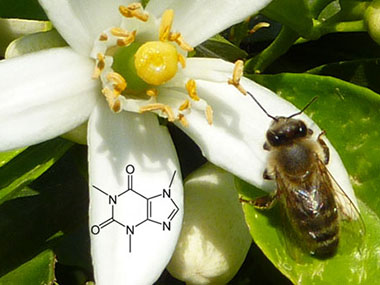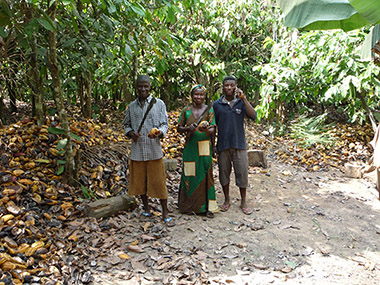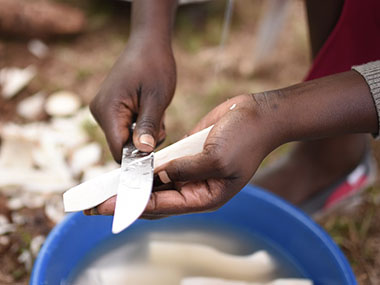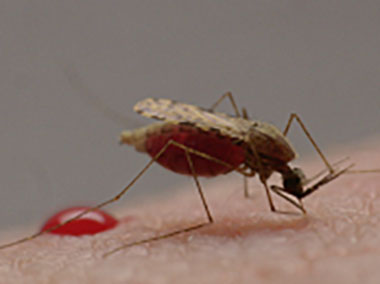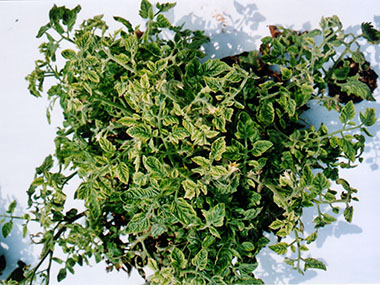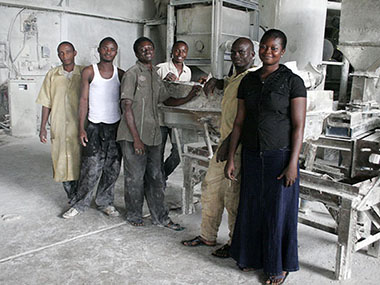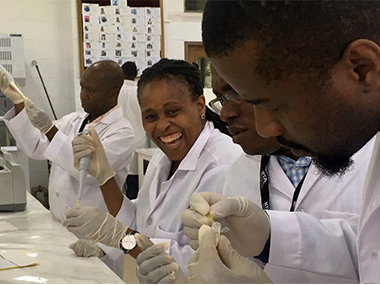Molecular Virology and Entomology
We aim to develop and disseminate improved diagnostic tools to detect plant pests and pathogens and understand complex plant-virus-vector interactions that will identify sustainable control measures.
The Molecular Virology and Entomology Research group undertakes strategic and applied research for controlling pests and diseases of tropical food crops especially those caused by viruses and insect vectors on cassava, sweet potato, yams and vegetables in many African and Asian countries. We develop and disseminate improved diagnostic tools for the rapid and efficient detection of plant pests and pathogens, understand complex plant-virus-vector interactions that will allow answering important epidemiological questions and undertake research to identify sustainable control measures. In our research, we employ both traditional and advanced technologies including identifying transgenic sources of resistance to crop pests, and discovering novel targets for virus and insect control by comparative genomics and transcriptomics. The current focus of our research includes:
- Research to generate an improved understanding of the factors contributing to the spread of cassava, yam and sweet potato virus disease epidemics in Africa and their control.
- Developing robust, low-cost laboratory and field diagnostic technologies for plant viruses and their vectors, focussing on root and tuber crop viruses (cassava, sweet potato and yam).
- Gaining insights into virus-host-vector interactions involving cassava mosaic viruses (Family Geminiviridae) and cassava brown streak viruses (Family Potyviridae) with their host cassava and common insect vector, Bemisia tabaci.
In support of our research activities, the Group is proactive in building public and private partnerships to promote the practical application of biotechnologies in Sub-Saharan Africa and their potential contribution to food security and sustainable agricultural production.
- Using High-Throughput Sequencing indexing to strengthen the yam (Dioscorea spp.) seed systems in Sub-Saharan Africa (2019-2022, Royal Society International Collaboration Award)
- Enabling Research Tools for Cassava and Yam Virologists and Breeders (Phase II, 2016-2021, Bill & Melinda Gates Foundation - BMGF funded)
- Development of on-farm robust diagnostic toolkits for yam virus diseases (2012-2018, BMGF-funded)
- African cassava whitefly: outbreak causes and sustainable solutions (2014-2018, BMGF-funded)
- CONNECTED: COmmunity Network for africaN vECTor borne plant viruses (led by Prof. Gary Foster, University of Bristol, Global Challenges Research Fund- GCRF funded)
- PEARL II: Improving Our Understanding and Response to Yam Badnaviruses Impacting Yam Growers in Northern Nigeria (2016-2019, led by Dr Aliyu Turaki, Kebbi State, Nigeria, BMGF-funded)
- Bio-ecology of and Host Plant Resistance to Bean Leaf Beetles: A Step Towards Sustainable Management in Uganda (2016-2019, led by Dr Michael Otim, National Crops Resources Research Institute, Uganda, BMGF-funded)
Current PhD students:
- Ruth O. Festus: Development and evaluation of novel diagnostic tools for African yam viruses
- Katherine Connor: Diversity and evolution of plant DNA viruses: implications of climate change for disease management
- Juan Paolo Sicat: Evolution of invasiveness of whiteflies belonging to the Bemisia tabaci species complex.
- Steven Sewe: Next Generation Sequencing (NGS) characterization of plant viral diversity and host interactions in West African yam (Dioscorea spp.)
- Phillip Abidrabo
Previous PhD students:
- Tadeo Kaweesi: Identification of new gene targets for control of cassava whitefly (Bemisia tabaci)
- Ajith Rathnayake: Establishing the link between plant stress signalling and activatable endogenous pararetroviruses
- Annet Namuddu: Identification of essential detoxification genes in African cassava whitefly populations as potential targets for silencing and effective pest control
- Joachim Nwezeobi: Transcriptomic and genomic analysis of the West African cassava whitefly populations
- Sona Vyskocilova: Gene flow between Bemisia tabaci Mediterranean (MED) populations and their host-plant preferences
- Medhavi Ranatunga: Immunological response to Leishmania infection of human cell
- Habibu Mugerwa (2018) Diversity, molecular characterisation and diagnostic tests to assist the development of effective whitefly, Bemisia tabaci, control in sub-Saharan Africa
- Nikunj Naik (2018) Computational characterization of gene families in the whitefly Bemisia tabaci
- Mitul Patel (2016) Assembly and annotation of the transcriptome and genome of the whitefly, Bemisia tabaci, generated using next generation sequencing technologies
- Springate S (2015) The cabbage whitefly, Aleyrodes proletella: outbreaks and potential solutions.
- Aliyu Turaki (2014) Are endogenous pararetrovirus sequences in yam genomes activatable and responsible for widespread badnavirus infections in West African yams?
- Nawres Sadeq (2013) Molecular characterisation of plant viruses infecting potato and vegetables in Iraq.
- M.M. Abarshi (2012) Biodiversity and pathogenicity of viruses causing cassava brown streak disease.
- Chowda Reddy RV (2004) Molecular characterisation of tomato leaf curl viruses and Bemisia tabaci.
- Herselman L (2003) Genetic linkage map development and identification of molecular markers linked to groundnut rosette disease aphid resistance in groundnut.
- Alicai T. (2003) Cassava mosaic resistant cassava: selective effects on cassava mosaic begomoviruses and reversion and recovery from cassava mosaic disease.
- Omongo CA. (2003) Bemisia tabaci, behaviour and ecology in relation to the spread of the cassava mosaic epidemic in Uganda.
- Lebas BSM (2002) Diversity of viruses infecting Dioscorea species in the South Pacific
- Nakyanzi M (2002) Molecular and pathogenic diversity of isolates of Mycosphaerella fijiensis from E.Africa
- Maruthi MN. (2001) Bemisia tabaci and geminivirus variability in relation to cassava mosaic disease.
- Abubakar Z. (2000) Development of diagnostic techniques for bacterial pathogens of crop plants in Tanzania.
- Thwaites RM (1999) Molecular studies on pathogenicity genes of vascular bacterial pathogens of Musa spp.
- Henríquez N P (1997). Diagnostic techniques for discrimination between the components of the corn stunt complex in Mexico and Central America.
- Jayaratne D L (1996) Detection and differentiation of potyviruses affecting yam.
- Nkere C.K., Otto E., Atiri G.I., Onyeka J., Silva G., Bömer M., Seal S.E and Kumar, P.L. (2020) Assessment of Yam mild mosaic virus coat protein gene sequence diversity reveals the prevalence of cosmopolitan and African group of isolates in Ghana and Nigeria. Current Plant Biology. https://doi.org/10.1016/j.cpb.2020.100156
- Silva G., Bömer M., Rathnayake A.I., Sewe S.O., Visendi P., Oyekanmi J.O., Quain M.D., Akomeah B., Kumar P.L. & Seal S.E. (2019) Molecular Characterization of a New Virus Species Identified in Yam (Dioscorea spp.) by High-Throughput Sequencing. Plants 8, 167. https://doi.org/10.3390/plants8060167
- Malka, O., Santos‐Garcia, D., Feldmesser, E., Sharon, E., Krause‐Sakate, R., Delatte, H., van Brunschot, S., Patel, M., Visendi Muhindira, P., Mugerwa, H., Seal, S., Colvin, J. and Morin, S. (2018) Species‐complex diversification and host‐plant associations in Bemisia tabaci: a plant‐defense, detoxification perspective revealed by RNAseq analyses. Molecular Ecology. Accepted Author Manuscript. (doi:10.1111/mec.14865)
- Silva, G. , Lecourt, J., Clover, G.R.G. and Seal, S.E. (2018) First record of Grapevine Pinot gris virus infecting Vitis vinifera in the United Kingdom. New Disease Reports, 38 (7). ISSN 2044-0588 (Online) (doi:10.5197/j.2044-0588.2018.038.007)
- The International Wheat Genome Sequencing Consortium (IWGSC) (including Visendi P.) (2018) Shifting the limits in wheat research and breeding using a fully annotated reference genome. Science 361, 6403. (https://doi.org/10.1126/science.aar7191)
- Vyskočilová S., Tay W.T., van Brunschot S., Seal S. and Colvin J. (2018) An integrative approach to discovering cryptic species within the Bemisia tabaci whitefly species complex. Scientific Reports 8: 10886. (https://www.nature.com/articles/s41598-018-29305-w)
- Bömer, Moritz , O’Brien, José A., Pérez-Salamó, Imma, Krasauskas, Jovaras, Finch, Paul, Briones, Andrea, Daudi, Arsalan, Souda, Puneet, Tsui, Tjir-Li, Whitelegge, Julian P., Bolwell, G. Paul and Devoto, Alessandra (2018) COI1-dependent jasmonate signalling affects growth, metabolites production and cell wall protein composition in Arabidopsis. Annals of Botany. pp. 1-13. ISSN 0305-7364 (Print), 1095-8290 (Online) (In Press) (doi:10.1093/aob/mcy109)
- Bömer, Moritz , Rathnayake, Ajith I., Visendi, Paul, Sewe, Steven O., Sicat, Juan Paolo A., Silva, Gonçalo , Kumar, P. Lava and Seal, Susan E. (2018) Tissue culture and next-generation sequencing: A combined approach for detecting yam (Dioscorea spp.) viruses. Physiological and Molecular Plant Pathology. ISSN 0885-5765 (Print), 1096-1178 (Online) (In Press) (doi:10.1016/j.pmpp.2018.06.003)
- Mugerwa, Habibu, Seal, Susan , Wang, Hua-Ling, Patel, Mitulkumar V., Kabaalu, Richard, Omongo, Christopher A., Alicai, Titus, Tairo, Fred, Ndunguru, Joseph, Sseruwagi, Peter and Colvin, John (2018) African ancestry of New World, Bemisia tabaci-whitefly species. Scientific Reports, 8 (1):2734. ISSN 2045-2322 (Print), 2045-2322 (Online) (doi:10.1038/s41598-018-20956-3)
- Boykin, Laura M., Kinene, Tonny, Wainaina, James M., Savill, Anders, Seal, Susan , Mugerwa, Habibu, Macfadyen, Sarina, Tay, Wee Tek, De Barro, Paul, Kubatko, Laura, Alicai, Titus, Omongo, Christopher A., Tairo, Fred, Ndunguru, Joseph and Sseruwagi, Peter (2018) Review and guide to a future naming system of African Bemisia tabaci species. Systematic Entomology, 43 (3). pp. 427-433. ISSN 0307-6970 (Print), 1365-3113 (Online) (doi:10.1111/syen.12294)
- Krupovic, Mart, Blomberg, Jonas, Coffin, John M., Dasgupta, Indranil, Fan, Hung, Geering, Andrew D., Gifford, Robert, Harrach, Balázs, Hull, Roger, Johnson, Welkin, Kreuze, Jan F., Lindemann, Dirk, Llorens, Carlos, Lockhart, Ben, Mayer, Jens, Muller, Emmanuelle, Olszewski, Neil, Pappu, Hanu R., Pooggin, Mikhail, Richert-Pöggeler, Katja R., Sabanadzovic, Sead, Sanfaçon, Hélène, Schoelz, James E., Seal, Susan , Stavolone, Livia, Stoye, Jonathan P., Teycheney, Pierre-Yves, Tristem, Michael, Koonin, Eugene V. and Kuhn, Jens H. (2018) Ortervirales: A new viral order unifying five families of reverse-transcribing viruses. Journal of Virology, 92 (12). 00515-00518. ISSN 0022-538X (Print), 1098-5514 (Online) (doi:10.1128/JVI.00515-18)
- Brewer, Helen C., Hird, Diane L., Bailey, Andy M., Seal, Susan E. and Foster, Gary D. (2018) A guide to the contained use of plant virus infectious clones. Plant Biotechnology Journal, 16 (4). pp. 832-843. ISSN 1467-7644 (Print), 1467-7652 (Online) (doi:10.1111/pbi.12876)
- Nkere, Chukwuemeka K., Oyekanmi, Joshua O., Silva, Gonçalo , Bömer, Moritz , Atiri, Gabriel I., Onyeka, Joseph, Maroya, Norbert G., Seal, Susan E. and Kumar, P. Lava (2018) Chromogenic detection of yam mosaic virus by closed-tube reverse transcription loop-mediated isothermal amplification (CT-RT-LAMP). Archives of Virology. ISSN 0304-8608 (Print), 1432-8798 (Online) (doi:10.1007/s00705-018-3706-0)
- Bömer, Moritz , Turaki, Aliyu, Rathnayake, Ajith, Silva, Goncalo , Lava Kumar, P. and Seal, Susan (2018) Rolling circle amplification to screen yam germplasm for badnavirus infections and to amplify and characterise novel badnavirus genomes. Bio-protocol, 8 (1). ISSN 2331-8325 (Online) (doi:10.21769/BioProtoc.2672)
- Tulpová, Zuzana, Luo, Ming-Cheng, Toegelová, Helena, Visendi, Paul, Hayashi, Satomi, Vojta, Petr, Paux, Etienne, Kilian, Andrzej, Abrouk, Michaël, Bartoš, Jan, Hajdúch, Marián, Batley, Jacqueline, Edwards, David, Doležel, Jaroslav and Šimková, Hana (2018) Integrated physical map of bread wheat chromosome arm 7DS to facilitate gene cloning and comparative studies. New Biotechnology. ISSN 1871-6784 (Print), 1876-4347 (Online) (In Press) (doi:10.1016/j.nbt.2018.03.003)
- Silva, Gonçalo , Oyekanmi, Joshua, Nkere, Chukwuemeka K., Bömer, Moritz , Kumar, Lava P. and Seal, Susan (2018) Rapid detection of potyviruses from crude plant extracts. Analytical Biochemistry, 546. pp. 17-22. ISSN 0003-2697 (Print), 1096-0309 (Online) (doi:10.1016/j.ab.2018.01.019)
- Kuhn, J. H., Krupovic, M., Harrach, B., Sabanadzovic, S., Sanfaçon, H., Koonin, E. V., … (including Seal S.) and Stavolone, L. (2017). Creation of new order, Ortervirales, for 5 families of reverse-transcribing viruses. (doi:10.13140/RG.2.2.24914.04804)
- Montenegro, Juan D., Golicz, Agnieszka A., Bayer, Philipp E., Hurgobin, Bhavna, Lee, HueyTyng, Chan, Chon-Kit Kenneth, Muhindira, Paul, Lai, Kaitao, Doležel, Jaroslav, Batley, Jacqueline and Edwards, David (2017) The pangenome of hexaploid bread wheat. The Plant Journal, 90 (5). pp. 1007-1013. ISSN 0960-7412 (doi:10.1111/tpj.13515)
- Tomlinson, Katie R., Bailey, Andy M., Alicai, Titus, Seal, Sue and Foster, Gary D. (2017) Cassava brown streak disease: historical timeline, current knowledge and future prospects. Molecular Plant Pathology. ISSN 1464-6722 (Print), 1364-3703 (Online) (doi:10.1111/mpp.12613)
- Bömer, Moritz , Rathnayake, Ajith I., Visendi, Paul, Silva, Gonçalo and Seal, Susan E. (2017) Complete genome sequence of a new member of the genus Badnavirus, Dioscorea bacilliform RT virus 3, reveals the first evidence of recombination in yam badnaviruses. Archives of Virology. ISSN 0304-8608 (Print), 1432-8798 (Online) (doi:10.1007/s00705-017-3605-9)
- Silva, G. , Lecourt, J., Clover, G.R.G. and Seal, S. E. (2017) First report of Grapevine fanleaf virus infecting grapevine in the United Kingdom. New Disease Reports, 36 (9). ISSN 2044-0588 (Online) (doi:10.5197/j.2044-0588.2017.036.009)
- Turaki, Aliyu A., Bömer, Moritz , Silva, Gonçalo , Kumar, P. Lava and Seal, Susan E. (2017) PCR-DGGE analysis: Unravelling complex mixtures of badnavirus sequences present in yam germplasm. Viruses, 9 (7). p. 181. ISSN 1999-4915 (Print), 1999-4915 (Online) (doi:10.3390/v9070181)
- Bömer, Moritz , Turaki, Aliyu A., Silva, Gonçalo , Kumar, P. Lava and Seal, Susan E. (2016) A sequence-independent strategy for amplification and characterisation of episomal badnavirus sequences reveals three previously uncharacterised yam badnaviruses. Viruses, 8:188. pp. 1-22. ISSN 1999-4915 (Print), 1999-4915 (Online) (doi:10.3390/v8070188)
- Staňková, Helena, Hastie, Alex R., Chan, Saki, Vrána, Jan, Tulpová, Zuzana, Kubaláková, Marie, Visendi, Paul, Hayashi, Satomi, Luo, Mingcheng, Batley, Jacqueline, Edwards, David, Doležel, Jaroslav and Šimková, Hana (2016) BioNano genome mapping of individual chromosomes supports physical mapping and sequence assembly in complex plant genomes. Plant Biotechnology Journal, 14 (7). pp. 1523-1531. ISSN 1467-7644 (Print), 1467-7652 (Online) (doi:10.1111/pbi.12513)
- Martins, Mónica, Assunção, Ana, Neto, André, Silva, Gonçalo , Sghaier, Haïtham and Costa, Maria Clara (2016) Performance and bacterial community shifts during phosphogypsum biotransformation. Water, Air, & Soil Pollution, 227 (12):437. pp. 1-10. ISSN 0049-6979 (Print), 1573-2932 (Online) (doi:10.1007/s11270-016-3129-z)
- Visendi, Paul, Berkman, Paul J., Hayashi, Satomi, Golicz, Agnieszka A., Bayer, Philipp E., Ruperao, Pradeep, Hurgobin, Bhavna, Montenegro, Juan, Chan, Chon-Kit Kenneth, Staňková, Helena, Batley, Jacqueline, Šimková, Hana, Doležel, Jaroslav and Edwards, David (2016) An efficient approach to BAC based assembly of complex genomes. Plant Methods, 12 (2). pp. 1-9. ISSN 1746-4811 (Print), 1746-4811 (Online) (doi:10.1186/s13007-016-0107-9)
- Al-Kuwaiti, N.A., Maruthi, M.N. and Seal, S.E. (2016) Molecular characterization of potyviruses infecting potato and vegetables in Iraq. Journal of Plant Pathology: An International Journal of the Italian Phytopathological Society, 98 (3). ISSN 1125-4653 (doi:/10.4454/JPP.V98I3.029)
- Silva, Gonçalo , Bömer, Moritz , Nkere, Chukwuemeka, Kumar, P. Lava and Seal, Susan E. (2015) Rapid and specific detection of Yam mosaic virus by reverse-transcription recombinase polymerase amplification. Journal of Virological Methods, 222. pp. 138-144. ISSN 0166-0934 (doi:10.1016/j.jviromet.2015.06.011)
- Gou, Lulu, Hattori, Jiro, Fedak, George, Balcerzak, Margaret, Sharpe, Andrew, Visendi, Paul, Edwards, David, Tinker, Nicholas, Wei, Yu-Ming, Chen, Guo-Yue and Ouellet, Thérèse (2015) Development and validation of –expressed molecular markers specific for the long arm of Chromosome 7E. Crop Science, 56 (1). pp. 354-363. ISSN 0011-183X (Print), 1435-0653 (Online) (doi:10.2135/cropsci2015.03.0184)
- Lai, Kaitao, Lorenc, Michał T., Lee, Hong Ching, Berkman, Paul J., Bayer, Philipp Emanuel, Visendi, Paul, Ruperao, Pradeep, Fitzgerald, Timothy L., Zander, Manuel, Chan, Chon-Kit Kenneth, Manoli, Sahana, Stiller, Jiri, Batley, Jacqueline and Edwards, David (2015) Identification and characterization of more than 4 million intervarietal SNPs across the group 7 chromosomes of bread wheat. Plant Biotechnology Journal, 13 (1). pp. 97-104. ISSN 1467-7644 (Print), 1467-7652 (Online) (doi:10.1111/pbi.12240)
- Bayer, Philipp E., Ruperao, Pradeep, Mason, Annaliese S., Stiller, Jiri, Chan, Chon-Kit Kenneth, Hayashi, Satomi, Long, Yan, Meng, Jinling, Sutton, Tim, Visendi, Paul, Varshney, Rajeev K., Batley, Jacqueline and Edwards, David (2015) High-resolution skim genotyping by sequencing reveals the distribution of crossovers and gene conversions in Cicer arietinum and Brassica napus. Theoretical and Applied Genetics, 128 (6). pp. 1039-1047. ISSN 0040-5752 (Print), 1432-2242 (Online) (doi:10.1007/s00122-015-2488-y)
- Umber, Marie, Filloux, Denis, Muller, Emmanuelle, Laboureau, Nathalie, Galzi, Serge, Roumagnac, Philippe, Iskra-Caruana, Marie-Line, Pavis, Claudie, Teycheney, Pierre-Yves and Seal, Susan E. (2014) The genome of African yam (Dioscorea cayenensis-rotundatacomplex) hosts endogenous sequences from four distinct badnavirus species. Molecular Plant Pathology, 15 (8). pp. 790-801. ISSN 1464-6722 (Print), 1364-3703 (Online) (doi:10.1111/mpp.12137)
- Seal, Susan , Turaki, Aliyu, Muller, Emmanuelle, Kumar, P. Lava, Kenyon, Lawrence, Filloux, Denis, Galzi, Serge, Lopez-Montes, Antonio and Iskra-Caruana, Marie-Line (2014) The prevalence of badnaviruses in West African yams (Dioscorea cayenensis-rotundata) and evidence of endogenous pararetrovirus sequences in their genomes. Virus Research, 186. pp. 144-154. ISSN 0168-1702 (Print), 1872-7492 (Online) (doi:10.1016/j.virusres.2014.01.007)
- Golicz, Agnieszka A., Martinez, Paula A., Zander, Manuel, Patel, Dhwani A., Van De Wouw, Angela P., Visendi, Paul, Fitzgerald, Timothy L., Edwards, David and Batley, Jacqueline (2014) Gene loss in the fungal canola pathogen Leptosphaeria maculans. Functional & Integrative Genomics, 15 (2). pp. 189-196. ISSN 1438-793X (Print), 1438-7948 (Online) (doi:10.1007/s10142-014-0412-1)
- Ruperao, Pradeep, Chan, Chon-Kit Kenneth, Azam, Sarwar, Karafiátová, Miroslava, Hayashi, Satomi, Čížková, Jana, Saxena, Rachit K., Šimková, Hana, Song, Chi, Vrána, Jan, Chitikineni, Annapurna, Visendi, Paul, Gaur, Pooran M., Millán, Teresa, Singh, Karam B., Taran, Bunyamin, Wang, Jun, Batley, Jacqueline, Doležel, Jaroslav, Varshney, Rajeev K. and Edwards, David (2014) A chromosomal genomics approach to assess and validate the desi and kabuli draft chickpea genome assemblies. Plant Biotechnology Journal, 12 (6). pp. 778-786. ISSN 1467-7644 (Print), 1467-7652 (Online) (doi:10.1111/pbi.12182)
- Collins, Carl, Patel, Mitulkumar V., Colvin, John, Bailey, David and Seal, Susan (2014) Identification and evaluation of suitable reference genes for gene expression studies in the whitefly Bemisia tabaci (Asia I) by reverse transcription quantitative realtime PCR. Journal of Insect Science, 14 (1):63. pp. 1-25. ISSN 1536-2442 (doi:10.1673/031.014.63)
- Al-Kuwaiti, N., Otto, B., Collins, C., Seal, S. and Maruthi, M. (2013) Molecular characterisation and first complete genome sequence of Tomato yellow leaf curl virus (TYLCV) infecting tomato in Iraq. New Disease Reports, 27:17. ISSN 2044-0588 (doi:10.5197/j.2044-0588.2013.027.017)
- Seal, Susan , Patel, Mitulkumar V., Collins, Carl, Colvin, John and Bailey, David (2012) Next generation transcriptome sequencing and quantitative real-time PCR technologies for characterisation of the Bemisia tabaci Asia 1 mtCOI phylogenetic clade. Journal of Integrative Agriculture, 11 (2). pp. 281-292. ISSN 2095-3119 (doi:10.1016/S2095-3119(12)60012-4)
- Clark, Christopher A., Davis, Jeffrey A., Abad, Jorge A., Cuellar, Wilmer J., Fuentes, Segundo, Kreuze, Jan F., Gibson, Richard, Mukasa, Settumba B., Tugume, Arthur K., Tairo, Fred Donati and Valkonen, Jari P.T. (2012) Sweetpotato viruses: 15 years of progress on understanding and managing complex diseases. Plant Disease, 96 (2). pp. 168-185. ISSN 0191-2917 (doi:10.1094/PDIS-07-11-0550)
- Chowda-Reddy, R.V., Kirankumar, M., Seal, Susan E. , Muniyappa, V., Valand, Girish B., Govindappa, M.R. and Colvin, John (2012) Bemisia tabaci phylogenetic groups in India and the relative transmission efficacy of Tomato leaf curl Bangalore virus by an indigenous and an exotic population. Journal of Integrative Agriculture, 11 (2). pp. 235-248. ISSN 2095-3119 (doi:10.1016/S2095-3119(12)60008-2)
- Pallavi, M.S., Ramappa, H.K., Shankarappa, K.S., Rangaswamy, K.T., Wickramaarachchi, W.A.R.T. and Maruthi, M.N. (2012) Detection and molecular characterization of phytoplasma associated with chickpea phyllody disease in south India. Phytoparasitic, 40 (3). pp. 279-286. ISSN 0334-2123 (Print), 1876-7184 (Online) (doi:10.1007/s12600-012-0221-9)
- Colvin, John, Nagaraju, N., Moreno Leguizamon, Carlos, Govindappa, R.M., Manjunatha Reddy, T.B., Padmaja, S.A., Joshi, Neena, Hanson, Peter M., Seal, Susan E. and Muniyappa, V. (2012) Socio-economic and scientific impact created by whitefly-transmitted, plant- virus disease resistant tomato varieties in Southern India. Journal of Integrative Agriculture, 11 (2). pp. 337-345. ISSN 2095-3119
- Mohammed, I.U., Abarshi, M.M., Muli, B., Hillocks, R.J. and Maruthi, M.N. (2012) The symptom and genetic diversity of cassava brown streak viruses infecting cassava in East Africa. Advances in Virology, 2012. ISSN 1687-8639 (Print), 1687-8647 (Online) (doi:10.1155/2012/795697)
- Abarshi, M.M., Mohammed, I.U., Jeremiah, S.C., Legg, J.P., Kumar, P. Lava, Hillocks, R.J. and Maruthi, M.N. (2011) Multiplex RT-PCR assays for the simultaneous detection of both RNA and DNA viruses infecting cassava and the common occurrence of mixed infections by two cassava brown streak viruses in East Africa. Journal of Virological Methods, 179 (1). pp. 176-184. ISSN 0166-0934 (doi:10.1016/j.jviromet.2011.10.020)
- Black, Robert, Fava, Fabio, Mattei, Niccolo, Seal, Susan and Verdier, Valerie (2011) Case studies on the use of biotechnologies and on biosafety provisions in four African countries. Journal of Biotechnology, 156 (4). pp. 370-381. ISSN 0168-1656 (doi:10.1016/j.jbiotec.2011.06.036)
- Wasswa, P., Otto, B., Maruthi, M.N., Mukasa, S.B., Monger, W. and Gibson, R.W. (2011) First identification of a sweet potato begomovirus (sweepovirus) in Uganda: Characterization, detection and distribution. Plant Pathology, 60 (6). pp. 1030-1039. ISSN 0032-0862 (Print), 1365-3059 (Online) (doi:10.1111/j.1365-3059.2011.02464.x)
- Legg, J.P., Jeremiah, S.C., Obiero, H.M., Maruthi, M.N., Ndyetabula, I., Okao-Okuja, G., Bouwmeester, H., Bigirimana, S., Tata-Hangy, W., Gashaka, G., Mkamilo, G., Alicai, T. and Lava Kumar, P. (2011) Comparing the regional epidemiology of the cassava mosaic and cassava brown streak virus pandemics in Africa. Virus Research, 159 (2). pp. 161-170. ISSN 0168-1702 (doi:10.1016/j.virusres.2011.04.018)
- Abarshi, M.M., Mohammed, I.U., Wasswa, P., Hillocks, R.J., Holt, J., Legg, J.P., Seal, S.E. and Maruthi, M.N. (2009) Optimization of diagnostic RT-PCR protocols and sampling procedures for the reliable and cost-effective detection of Cassava brown streak virus. Journal of Virological Methods, 163 (2). pp. 353-359. ISSN 0166-0934 (doi:10.1016/j.jviromet.2009.10.023)
- Fahleson, J., Nakyanzi, M., Okori, P., Seal, S. , Kenyon, L. and Dixelius, C. (2009) Genetic analysis of Mycosphaerella fijiensis in the Ugandan Lake Victoria region reveals a homogenous population. Plant Pathology, 58 (5). pp. 888-897. ISSN 1365-3059 (online) (doi:10.1111/j.1365-3059.2009.02099.x)
- Bousalem, Mustapha, Durand, O., Scarcelli, N., Lebas, B.S.M., Kenyon, L., Marchand, J.-L., Lefort, F. and Seal, S.E. (2009) Dilemmas caused by endogenous pararetroviruses regarding the taxonomy and diagnosis of yam (Dioscorea spp.) badnaviruses: Analyses to support safe germplasm movement. Archives of Virology, 154 (2). pp. 297-314. ISSN 0304-8608 (Print), 1432-8798 (Online) (doi:10.1007/s00705-009-0311-2)
- Bousalem, M., Douzery, E.J.P. and Seal, S.E. (2008) Taxonomy, molecular phylogeny and evolution of plant reverse transcribing viruses (family Caulimoviridae) inferred from full-length genome and reverse transcriptase sequences. Archives of Virology, 153 (6). pp. 1085-1102. ISSN 0304-8608 (Print), 1432-8798 (Online) (doi:10.1007/s00705-008-0095-9)
- Kenyon, Lawrence, Lebas, B.S.M. and Seal, S.E. (2008) Yams (Dioscorea spp.) from the South Pacific Islands contain many novel badnaviruses: Implications for international movement of yam germplasm. Archives of Virology, 153 (5). pp. 877-889. ISSN 0304-8608 (Print), 1432-8798 (Online) (doi:10.1007/s00705-008-0062-5)
- Monger, W.A., Harju, V., Skelton, A., Seal, Susan and Mumford, R.A. (2007) Brief Report: Canna yellow streak virus: a new potyvirus associated with severe streaking symptoms in canna. Archives of Virology, 152 (8). pp. 1527-1530. ISSN 0304-8608 (doi:10.1007/s00705-007-0977-2)
- Seal, Susan and Muller, Emanuelle (2007) Molecular analysis of a full-length sequence of a new yam badnavirus from Dioscorea sansibarensis. Archives of Virology, 152 (4). pp. 819-825. ISSN 0304-8608 (Print), 1432-8798 (Online) (doi:10.1007/s00705-006-0888-7)
- Seal, Susan , Jeger, M.J. and vandenBosch, F. (2006) Factors influencing begomovirus evolution and their increasing global significance: implications for sustainable control. Critical Reviews in Plant Sciences, 25 (1). pp. 23-46. ISSN 0735-2689 (doi:10.1080/07352680500365257)
- Rajeshwari, R., Reddy, R.V.C., Maruthi, M.N., Colvin, J., Seal, S.E. and Muniyappa, V. (2005) Host range, vector relationships and sequence comparison of a begomovirus infecting hibiscus in India. Annals of Applied Biology, 147 (1). pp. 15-25. ISSN 0003-4746 (doi:10.1111/j.1744-7348.2005.00005.x)
- Maruthi, M.N., Colvin, John, Gibson, Gabriella, Thwaites, Richard M., Banks, Gina K. and Seal, Susan E. (2004) Reproductive incompatibility and cytochrome oxidase I gene sequence variability amongst host-adapted and geographically separate Bemisia tabaci populations (Hemiptera: Aleyrodidae). Systematic Entomology, 29 (4). pp. 560-568. ISSN 0307-6970 (doi:10.1111/j.0307-6970.2004.00272.x)
- Maruthi, M.N., Seal, S. , Colvin, J., Briddon, R.W. and Bull, S.E. (2004) East African cassava mosaic Zanzibar virus – a recombinant begomovirus species with a mild phenotype. Archives of Virology, 149 (12). pp. 2365-2377. ISSN 0304-8608 (Print), 1432-8798 (Online) (doi:10.1007/s00705-004-0380-1)
- Maruthi, M.N., Colvin, J., Seal, S. , Gibson, G. and Cooper, J. (2002) Co-adaptation between cassava mosaic geminiviruses and their local vector populations. Virus Research, 86 (1-2). pp. 71-85. ISSN 0168-1702 (doi:10.1016/S0168-1702(02)00051-5)
- Maruthi, M.N., Colvin, J., Seal, S. and Thresh, J.M. (2002) First report of a distinct begomovirus infecting cassava in Zanzibar. Plant Disease, 86 (2). p. 187. ISSN 0191-2917 (doi:10.1094/PDIS.2002.86.2.187A)
- Maruthi, M.N., Colvin, J. and Seal, S. (2001) Mating compatibility, life-history traits, and RAPD-PCR variation in Bemisia tabaci associated with the cassava mosaic disease pandemic in East Africa. Entomologia Experimentalis et Applicata, 99 (1). pp. 13-23. ISSN 0013-8703 (doi:10.1046/j.1570-7458.2001.00797.x)
- Banks, G.K., Colvin, J., Chowda, Reddy R.V., Maruthi, M.N., Muniyappa, V., Venkatesh, H.M., Kiran Kumar, M., Padmaja, A.S., Beitia, F.J. and Seal, S.E. (2001) First report of the Bemisia tabaci B biotype in India and an associated tomato leaf curl virus disease epidemic. Plant Disease, 85 (2). p. 231. ISSN 0191-2917 (doi:10.1094/PDIS.2001.85.2.231C)


